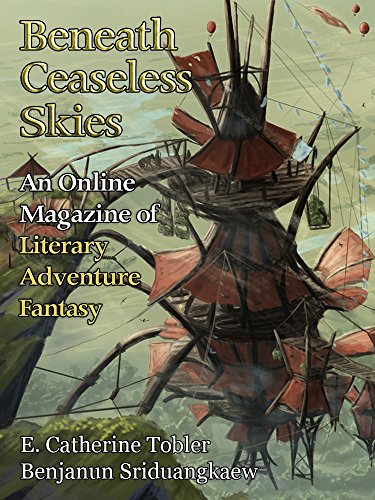 Beneath Ceaseless Skies #204, July 21, 2016
Beneath Ceaseless Skies #204, July 21, 2016
“Ebb Stung by the Flow” by E. Catherine Tobler
Reviewed by Alex Hurst
Trains, war, marmalade and the Moirai meet in the inexplicable and surreal world of E. Catherine Tobler‘s traveling circus universe. “Ebb Stung by the Flow” follows one of three sisters––each in charge of the threads of the world and all fates as they exist––as she tries to alter the many destinies of Jackson, a former student and celestial monster, and in the process, her own. Known once as Sister Jerome Grace, but now the unstoppable engine of Jackson’s Unreal Circus and Mobile Marmalade’s train, Jerome plummets into an implied fun house of mirrors after crashing into another train on the tracks, only to have her spirit shoved into the body of her student. Living in human flesh once more, even though it is Jackson she possesses, Jerome drifts through the windows of his life, eventually coming to terms with the fear that makes her run from her own fate.
Experimental in nature, the literal and the surreal go hand-in-hand within Tobler’s latest work, a story set in her ever-expanding traveling circus universe. Jerome’s fluid shift from coal-burning train to decrepit old man is almost Kafka-esque, working well in this carnival-themed, hallucinatory tale. The visions and metaphor that pepper “Ebb Stung by the Flow” are exquisite, and while elements of the universe are left out for this particular story, it is easy to get swept up in the flow of the narrative.
In the desolate city of Talyut, territorial and material disputes are settled by champions in a great arena. Melishem and Sikata, childhood friends, were raised training together, fighting together, until the year the selection for Talyut’s champion pitted them against one another. Melishem, defeated, begins a long journey to gain power, and by the time she returns (where “Under She Who Devours Suns” starts), hardly human and ready for a rematch, she discovers that Sikata has succumbed to a wound from battle. Melishem’s solution? Resurrect her old friend so they can battle to the death.
Benjanun Sriduankaew paints a vivid world with intricate details, such as the moths that hold Melishem’s body together at the joints, or the ceramic-like texture of Sikata’s simulacrum body. The setting breathes a sense of genuineness, such that the reader can be transported to the tables the characters eat at, the arenas they fight in, and the skin that they wear. A solid story of rival friends, and the loyalty—and unspoken truths––between them.